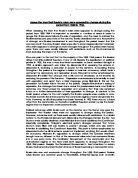How valid is the view that, in the period 1855 1964, the lives of the peasants in Russia were constantly miserable?
How valid is the view that, in the period 1855 – 1964, the lives of the peasants in Russia were constantly miserable?
The statement in the question argues that, throughout the whole period of Russian history being studied, the lives of Russian peasants remained constantly miserable. This therefore suggests that all of Russia’s peasants suffered the same amount throughout this period. It could also argue that the level of suffering remained the same for all peasants in this period.
It is obvious that Russian peasants did suffer throughout this period. Whilst in power, both Tsars and Communists exploited the peasantry, beginning at the end of the Crimean War when it was clear that Russia needed to catch up with the rest of Europe and modernise. Peasants always had poor living and working conditions to contend with, one historian argued that peasantry is “the grimmest aspect of a grim topic”, when talking about Russian history. Good examples to support this quote are the famines of 1921 and 1932, both under Communist rule. These were a result of rioting against collectivisation. Peasants did not want to hand over their equipment or produce to the Communists and purposely sabotaged their own stock to rebel. Different historians have estimated at how many deaths were a result of the famines, numbers have been as widely predicted between five and fifteen million people. An example of when the level of suffering was very similar for peasants was when serfdom was in place. Peasants at this point were essentially treated as slaves and had no rights. It would therefore seem that the evidence given so far would agree with the statement in the question.








